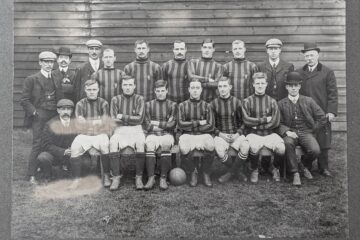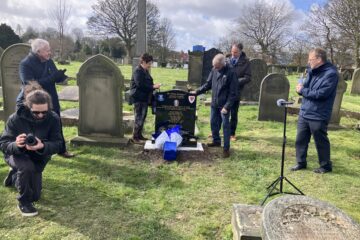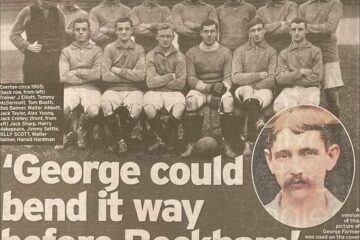Alfred Vaughan was about eight weeks short of his 27th birthday when he made his one and only Football League appearance for Everton. He was born of Welsh parentage on 4 April 1871 in the North Wales coastal town of Rhyl. His father Edward worked as a joiner and his mother’s name was Margaret. The family first lived at Windsor Stree,t before moving to Queen Street, where Margaret, assisted by her daughter, ran a confectionary business, while Alfred joined his father in the carpentry trade. He began playing amateur football locally, until in 1898 Rhyl Athletic amalgamated with Rhyl United and joined a Combination League that consisted almost entirely of teams from North Wales and Merseyside. The club was known simply as Rhyl, and Vaughan was appointed captain.
It was the first time a Rhyl football team had left the North Wales area, and the local newspaper detailed a journalist – who wrote under the non-de-plume of Phillip, to accompany them on their travels. He left his readers with this detailed, and sometimes uncomplimentary, account of the day they left home in order to play South Liverpool…
Rhyl allowed themselves ample time to journey to Liverpool last Saturday leaving on the 10:28 train. We reached the “Black Spot on the Mersey” at 12:30 and “dinner money” having been doled out, we repaired to different hotels and there discussed our respective dinners. At 2 o’clock we assembled under the clock at Lime Street Station and espying a Park Road tram we hailed it and took our positions on the outside seats. In a fog that we could almost eat, we transversed through one of the most uninviting parts of Liverpool to the field of slaughter, which is situated in Wellington Road almost within a stone throw from the Mersey. The playing field was true as it sloped from one touchline to the other, but it was in fair condition and an improvement on most of the grounds I have seen thus far. There was a capital reserved enclosure and a commodious covered grandstand. Almost only the occupants however, were a couple from Rhyl, who accompanied the team, and a host of Rhylites who are now flourishing in Liverpool. Need I say we formed distinctly the most respectable position of the spectators? It did one’s heart good to see the enthusiasm of the “Old Boys” for the old town, and it was not it was not because they lacked encouraging cheers of their friends, that Rhyl returned home beaten by 5 goals to 1. Quite 1,500 people lined the ropes when operations commenced at 3 o clock. (Rhyl Record and Advertiser, 19 November 1898.)
On the 3 December 1898, Rhyl were back in Liverpool to take on the Everton Second X1. They were beaten 9-0. The return game took place three weeks later on Victoria Park, where Everton won again by the reduced score of five goals to one. Nevertheless, the play of Vaughan had been impressive and when approached by a member of the Everton executive, he agreed to register with the club, signing an amateur form. This arrangement allowed him to continue playing for Rhyl until he was called up on to assist Everton, which came on 14 January 1899 against Preston North End at Goodison Park. Vaughan, playing at centre half, did what was required of him as his side won two-nil.
The Welshman, who was playing the best football of his career, next week took part in a Welsh FA trial game, North v South, at Wrexham, but failed to be selected for full international honours. His Rhyl side, in the meantime, were finding life difficult in the Combination, but eventually they did improve their position in the table. Alfred Vaughan continued to play for the club until his retirement early in the next century.
By 1901 his mother had been widowed and was running a large boarding house at 40 West Parade in Rhyl. Alfred, also residing at this address, was still working as a joiner. In 1907, he married Clara Gunner – the daughter of boot manufacturer – at a non-conformist chapel in Rhyl. The couple moved to Ruthin, where their son Arthur was born. It was here he moved into the boot manufaturing trade, no doubt with the support of his father-in-law, and was employed as a boot dealer employing two people. Alfred lived in Ruthin until the death of Clara, before moving back to Queens Street in Rhyl. Alfred Vaughan spent his last days working as joiner, until his death at St Asaph in 1941.



